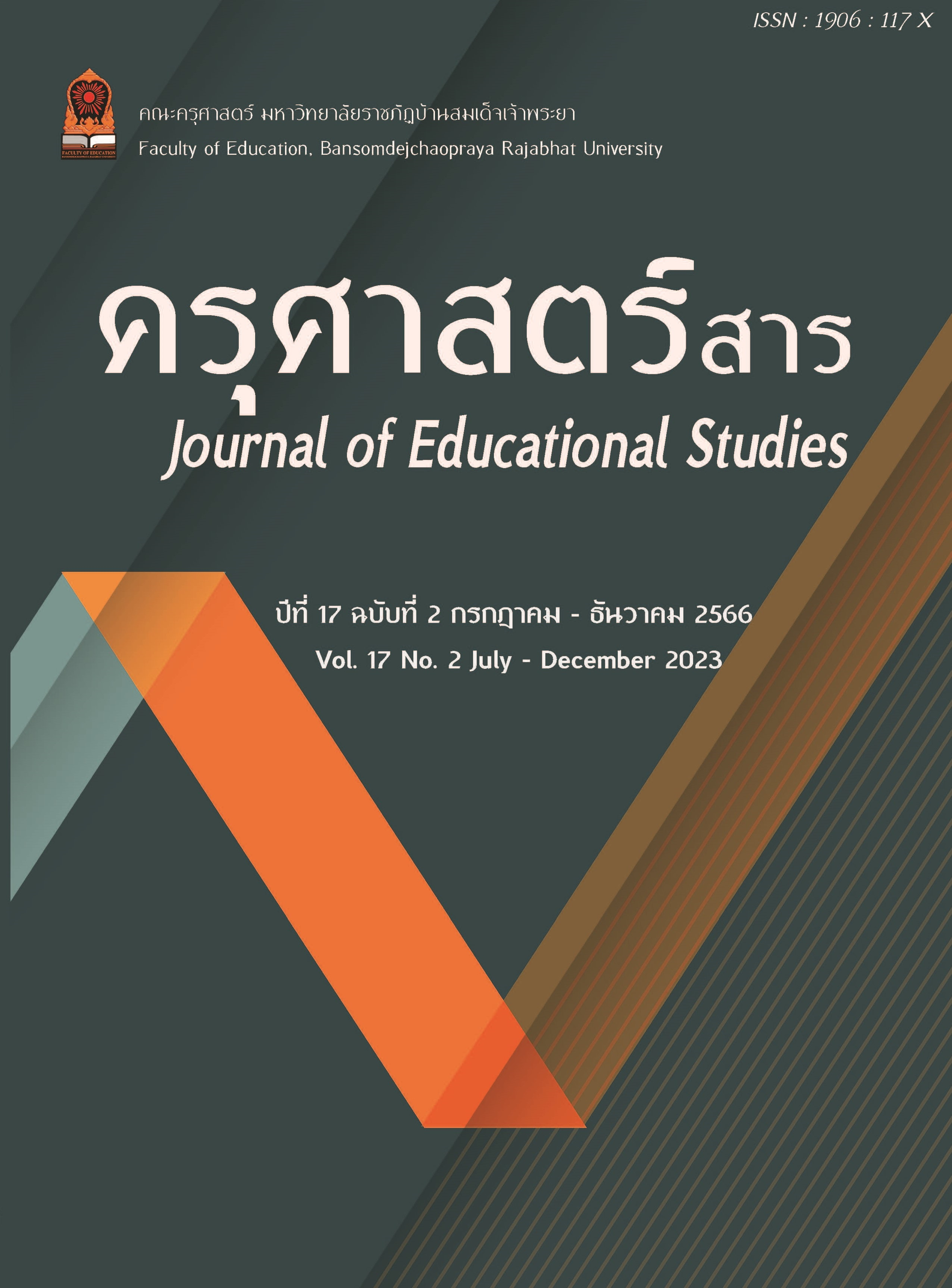A new paradigm in assessing professional competency in teaching
Keywords:
new paradigm, expertise Assessment, teaching Profession, teaching divisionAbstract
The teaching professional assessment system is a process used by administrators to consider the teacher's performance as follows: At what level can a teacher work? to compare with the standard set including information Back to teachers to improve and develop their work to be more efficient.
The assessment system for teaching professional practice expertise in teaching division aims to assess expertise in teaching professional practice in teaching division. The system aims to meet the goals of both teacher assessment and development with feedback and a support system that facilitates continuous skill development/performance of teachers. The assessment covers both teaching and learning of teachers. Behavior in the teaching profession and outcomes for students. It also pays attention to conditions/factors related to student learning and teacher performance. Emphasis on a variety of information, including information from observations taught in class. Achievement from standardized exams and empirical evidence. The use of assessment information is another important element in the system that facilitates its use in improving teaching and learning and improving the quality of education in order to achieve the learning objectives of learners.
Downloads
References
กาญจนา จองเดิม. (2563). การสัมภาษณ์ เข้าถึงการสัมภาษณ์เมื่อวันที่ 10 ต.ค.2563 . โรงแรมกานต์มณี กรุงเทพมหานคร
เกษม วัฒนชัย. (2562). บทความการพัฒนาการศึกษาชาติ. เอกสารประกอบการประชุมวิชาการ มหาวิทยาลัยทักษิณ.
ชนาธิป ทุ้ยแป. (2551). การพัฒนาระบบการประเมินผลการปฏิบัติงานสำหรับครูผู้สอนระดับการศึกษา
วิทยานิพนธ์ครุศาสตรดุษฎีบัณฑิต, การวัดและประเมินผลการศึกษา, จุฬาลงกรณ์มหาวิทยาลัย.
ซีมีโอ (SEAMEO). (2019). Upgrade Classroom Observation Coding Protocol. Adapted from UTeach Natural Sciences, University of Texas at Austin’s 2012 Adaption of Horizon Research, Inc. 2005–06 Core Evaluation Manual: Classroom Observation Protocol by the Consortium for Policy Research in Education, Teachers College Last Updated: 06/19/13
พิมพ์พันธ์ เดชะคุปต์.(2562). การพัฒนาวิชาชีพครูในศตวรรษที่ 21 . เอกสารประกอบการประชุมงาน EDUCA 2019.
มนตรี แย้มกสิกร และคณะ. (2564). การพัฒนากระบวนการประเมินความเชี่ยวชาญในการประกอบวิชาชีพของข้าราชการครูและบุคลากรทางการศึกษา สายงานการสอน กรุงเทพฯ: สำนักงานคณะกรรมการข้าราชการครูและบุคลากรทางการศึกษา.
มนตรี แย้มกสิกร. (2559). ชุมชนแห่งการเรียนรู้ทางวิชาชีพ: ความท้าทายต่อการเปลี่ยนตนเองของครู. เอกสารประกอบการประชุมทางวิชาการของคุรุสภา ประจำปี 2559 วันที่ 27-28 สิงหาคม, เรื่อง การวิจัยนวัตกรรมการเรียนรู้และการจัดการศึกษาเพื่อการพัฒนาที่ยั่งยืน. กรุงเทพฯ: องค์การค้าของ สกสค.
ราชกิจจานุเบกษา. (2556). ข้อบังคับคุรุสภาว่าด้วยจรรยาบรรณของวิชาชีพ พ.ศ. 2556. เล่ม 130 ตอนพิเศษ 130 ง. ลงวันที่ 4 ตุลาคม 2556.
ราชกิจจานุเบกษา. (2556). ข้อบังคับคุรุสภาว่าด้วยมาตรฐานวิชาชีพ พ.ศ. 2556. เล่ม 130 ตอนพิเศษ 130 ง. ลงวันที่ 4 ตุลาคม 2556.
ราชกิจจานุเบกษา. (2562). ข้อบังคับคุรุสภาว่าด้วยมาตรฐานวิชาชีพ (ฉบับที่ 4) พ.ศ. 2562. เล่ม 136 ตอนพิเศษ 68 ง. ลงวันที่ 20 มีนาคม 2562.
ราชกิจจานุเบกษา. (2563). ประกาศคณะกรรมการคุรุสภา เรื่อง หลักเกณฑ์และวิธีการทดสอบและประเมินสมรรถนะทางวิชาชีพครู พ.ศ. 2563. เล่ม 137 ตอนพิเศษ 109 ง. ลงวันที่ 7 พฤษภาคม 2563.
สมจิต ตาคำแสง. (2563). การสัมภาษณ์ เข้าถึงการสัมภาษณ์เมื่อวันที่ 10 ต.ค.2563 . โรงแรมกานต์มณี กรุงเทพมหานคร
สำนักงานเขตพื้นที่การศึกษาประถมศึกษาจันทบุรี เขต 1. (2563). สรุปรายละเอียดหลักเกณฑ์และวิธีการให้ข้าราชการครูและบุคลากรทางการศึกษาตำแหน่งครู มีและเลื่อนวิทยฐานะ. สืบค้น 2 ตุลาคม 2563, จาก http://www.chan1.go.th/web_th/wp-content/uploads/2018/03/A8.pdf
สำนักงานคณะกรรมการข้าราชการครูและบุคลากรทางการศึกษา. (2564). คู่มือการดำเนินการตามหลักเกณฑ์และวิธีการประเมินตำแหน่งและวิทยฐานะข้าราชการครูและบุคลากรทางการศึกษา. สืบค้นเมื่อ 20 มกราคม 2565 จาก https://otepc.go.th/images/00_YEAR2564/03_PV1/1Mv9-2564.pdf
สำนักงานเลขาธิการคุรุสภา. (2561). (ร่าง) มาตรฐานความรู้วิชาชีพครู ฐานสมรรถนะของคุรุสภา. สืบค้นเมื่อ 20 มกราคม 2563 จาก http://www.local.moi.go.th/2009/pdf/ksp1.pdf
สำนักงานเลขาธิการคุรุสภา. (2562). มาตรฐานความรู้วิชาชีพครู ฐานสมรรถนะของคุรุสภา. สืบค้นเมื่อ 20 มกราคม 2563 จาก http://www.local.moi.go.th/2009/pdf/ksp1.pdf
Curtis, R., & Wiener, R. (2012a). A guide to developing teacher evaluation system that support growth and development. Retrieved January 20, 2020 from https://www.wyoleg.gov/InterimCommittee/2012/O03MeanstoanEnd.pdf
Curtis, R., Wiener, R. (2012b). Means to an end: A guide to developing teacher evaluation systems that support growth and development. Washington, DC: The Aspen Institute, Education & Society Program.
Daley, G., & Kim, L. (2010). A teacher evaluation system that works. Retrieved January 20,2020 from https://files.eric.ed.gov/fulltext/ED533380.pdf
Danielson, C. (2010). Evaluations that help teachers learn. Educational Leadership, 68(4), 35–39.
Danielson, C. (n.d.). Teacher evaluation. Retrieved January 20, 2020 from www.cnedu.pt/content/antigo/images/stories/PDF/Charlotte_Danielson__Teacher_Evaluation.pdf
Dearbornschools. (2020). Charlotte Danielson’s FRAMEWORK FOR TEACHING. Retrieved 11 October 2020, form https://humanresources.dearbornschools.org/wpcontent/uploads/sites/103/2013/09/FFT-Smart-Card.pdf
Gitomer, D. H., Crouse, K., Joyce, J. (n.d.) A Review of the DC IMPACT Teacher Evaluation System. Retrieved January 20, 2020 from https://sites.nationalacademies.org/cs/groups/dbassesite/documents/webpage/dbasse_160397.pdf
Glazerman, S., Goldhaber, D., Loeb, S., Staiger, D., Raudenbush, S., & Whitehurst, G. J. (2011). Passing muster: Evaluating teacher evaluation systems. Washington DC: The Brookings Institution.
Goe, L., Holdheide, L., & Miller, T. (2011). A practical guide to designing comprehensive teacher evaluation systems: A tool to assist in the development of teacher evaluation systems. Washington, DC: National Comprehensive Center for Teacher Quality. Retrieved January 20, 2020 from https://files.eric.ed.gov/fulltext/ED520828.pdf
Hassard, j. (2012). Georgia Department of Education says evaluation plan won't work but will implement it anyway?. Retrieved January 20, 2020 from http://jackhassard.org/Georgia-department-education-evaluation-plan-work-2/
Indiana Department of Education. (n.d.). RISE evaluation and development system: Evaluator and teacher handbook version 2.0. Retrieved January 20, 2020 from https://www.doe.in.gov/sites/default/files/evaluations/rise-handbook-2-0-final.pdf
Learning Sciences Marzano Center. (2013). Developing a passion for professional teaching: The Marzano Teacher Evaluation Model. Retrieved January 20, 2020 from https://www.learningsciences.com/wp/wp-content/uploads/2018/05/TheMarzano-Teacher-Evaluation-Model.pdf
Liu, Z., Zhao, G., & Ding, Y. (2008). The analysis, design and implementation of University Teachers Evaluation System based on UML technology. 2008 International Conference on Computer Science and Software Engineering 12-14 Dec. 2008.
OECD. (2013a). OECD reviews of evaluation and assessment in education: Teacher evaluation in Chile. Retrieved January 20, 2020 from https://www.oecd.org/chile/OECD%20Review%20Teacher%20Evaluation%20Chile%20main%20conclusions.pdf
OECD. (2013b). Synergies for better learning: An international perspective on evaluation and assessment, OECD reviews of evaluation and assessment in education. Paris: OECD Publishing.
The New Teacher Project. (2010). Teacher evaluation 2.0. Retrieved January 20, 2020 from https://tntp.org/assets/documents/Teacher-Evaluation-Oct10F.pdf
University of Chicago Consortium. (2016). Teacher evaluation in Chicago key findings from consortium research. Retrieved January 20, 2020 from https://consortium.uchicago.edu/sites/default/files/2018-10/Teacher%20Evaluation%20Retrospective-Jan2016-Consortium.pdf
Downloads
Published
How to Cite
Issue
Section
License

This work is licensed under a Creative Commons Attribution-NonCommercial-NoDerivatives 4.0 International License.
บทความที่ได้รับการตีพิมพ์เป็นลิขสิทธิ์ของคณะครุศาสตร์ มหาวิทยาลัยราชภัฏบ้านสมเด็จเจ้าพระยา
ข้อความที่ปรากฏในบทความแต่ละเรื่องในวารสารวิชาการเล่มนี้เป็นความคิดเห็นส่วนตัวของผู้เขียนแต่ละท่านไม่เกี่ยวข้องกับมหาวิทยาลัยราชภัฏบ้านสมเด็จเจ้าพระยา และคณาจารย์ท่านอื่นๆในมหาวิทยาลัยฯ แต่อย่างใด ความรับผิดชอบองค์ประกอบทั้งหมดของบทความแต่ละเรื่องเป็นของผู้เขียนแต่ละท่าน หากมีความผิดพลาดใดๆ ผู้เขียนแต่ละท่านจะรับผิดชอบบทความของตนเอง



